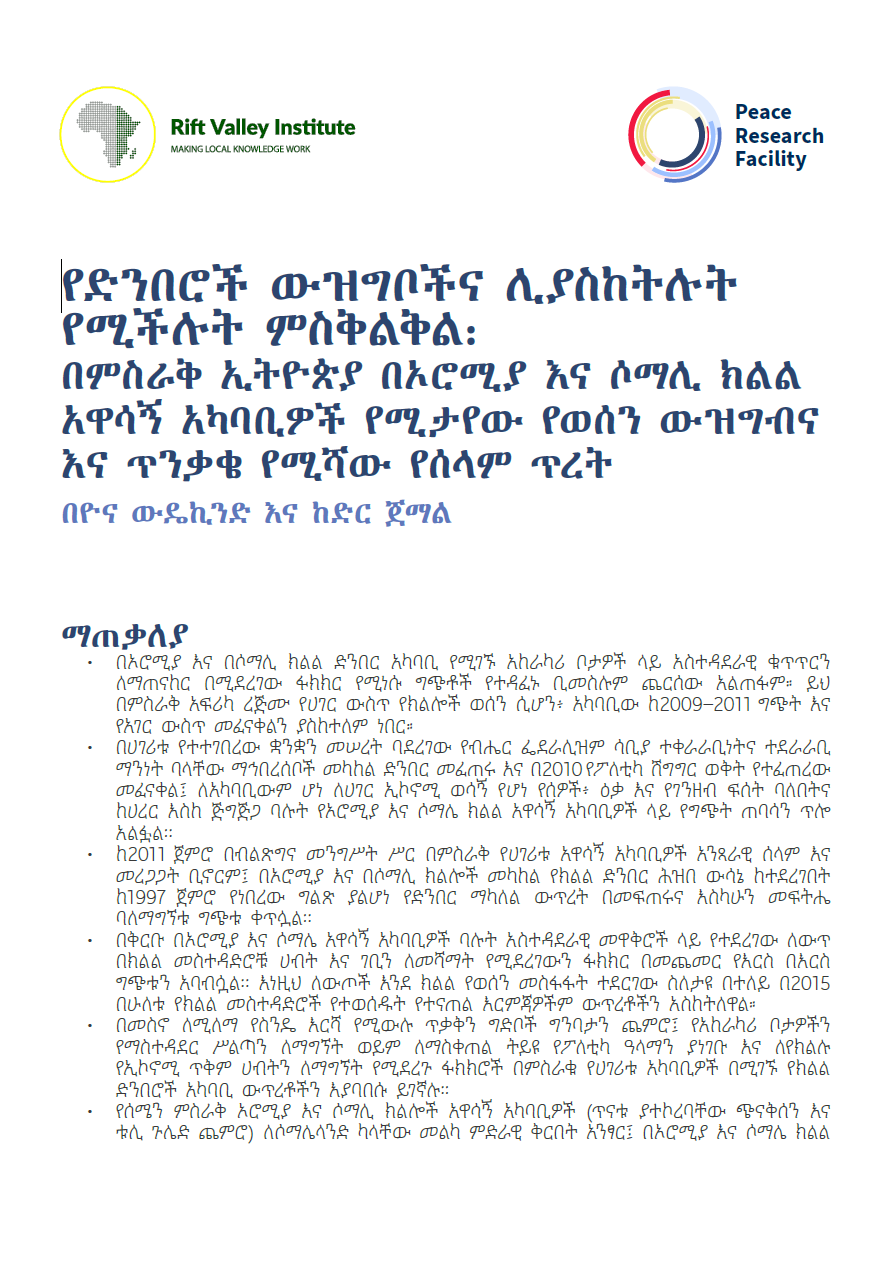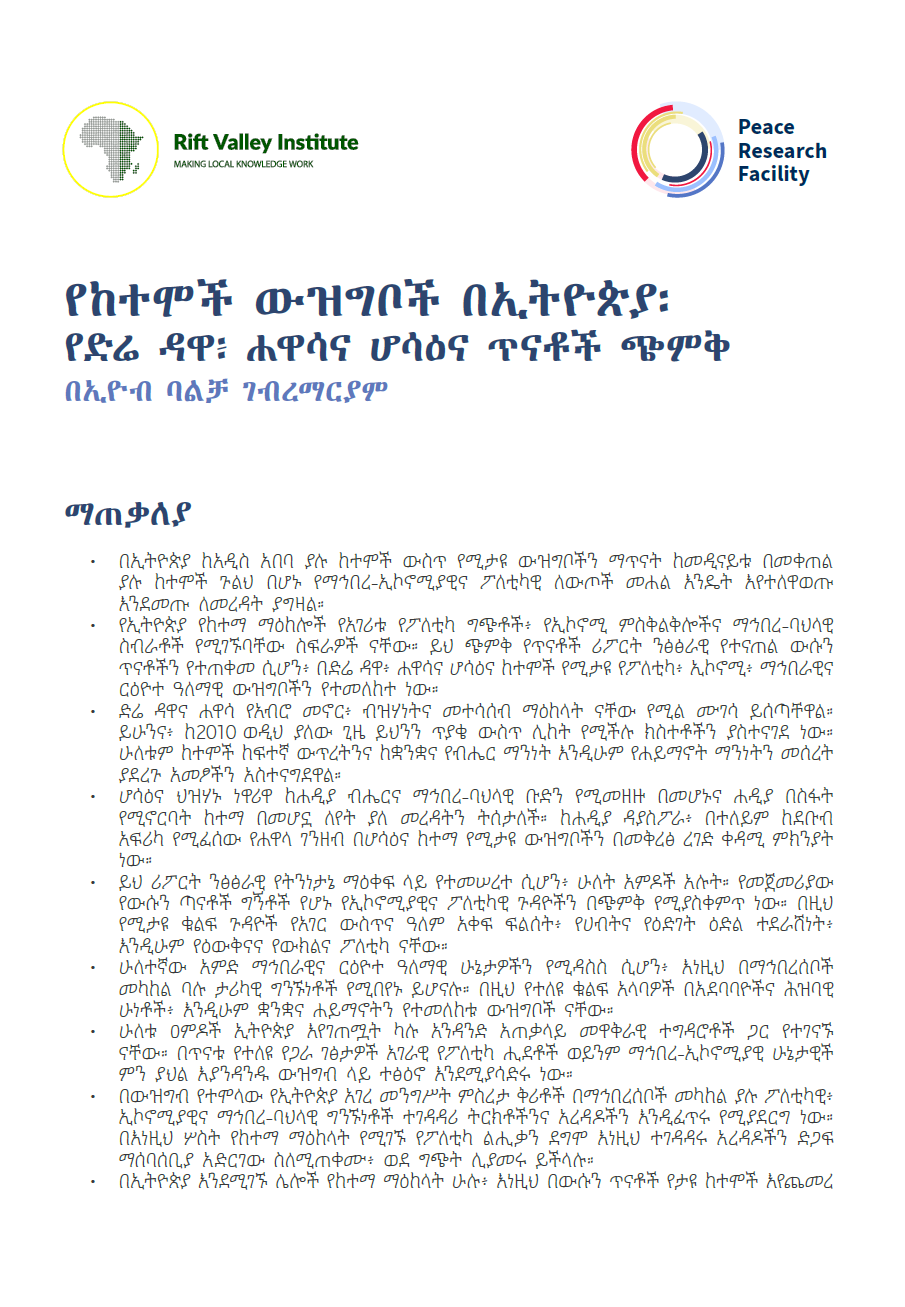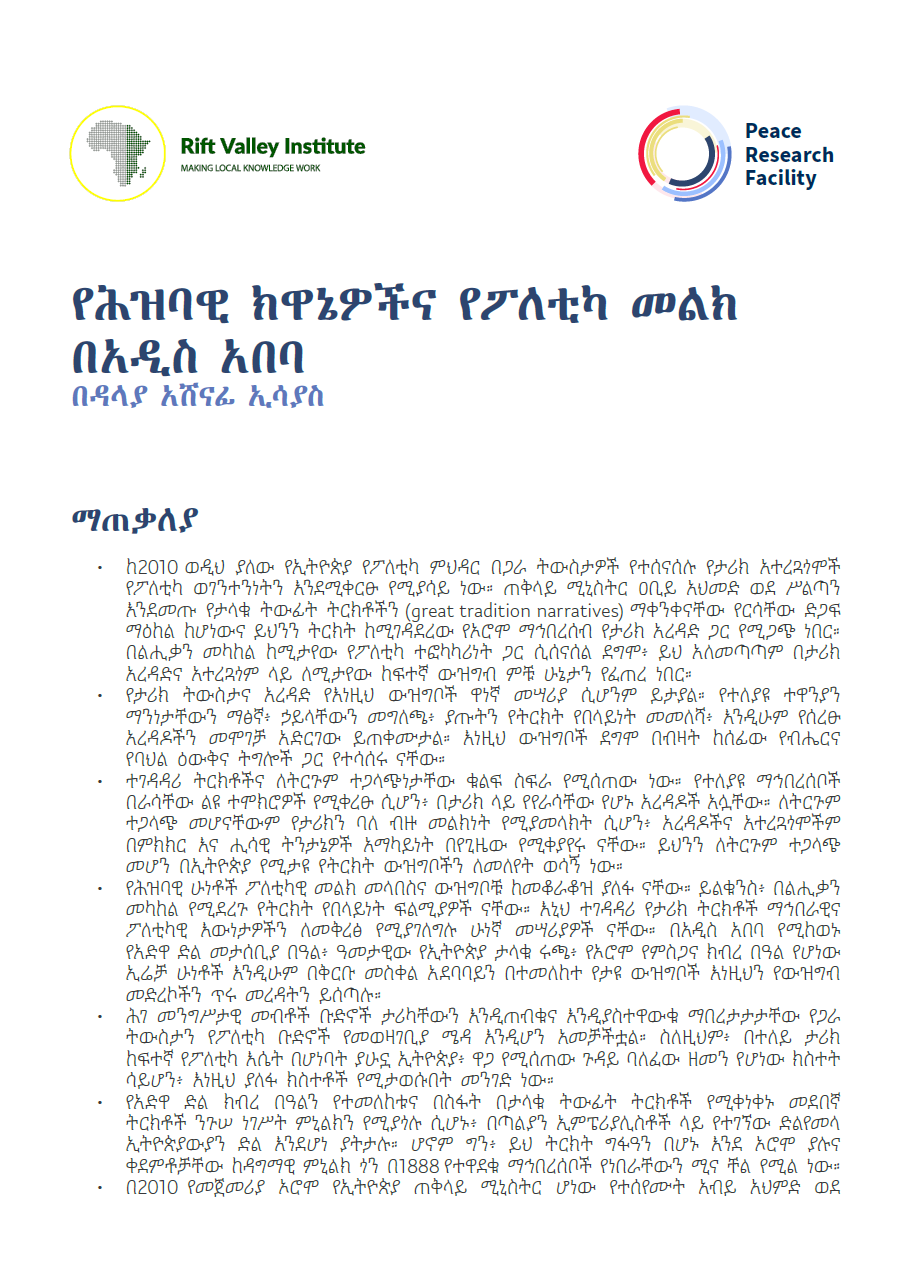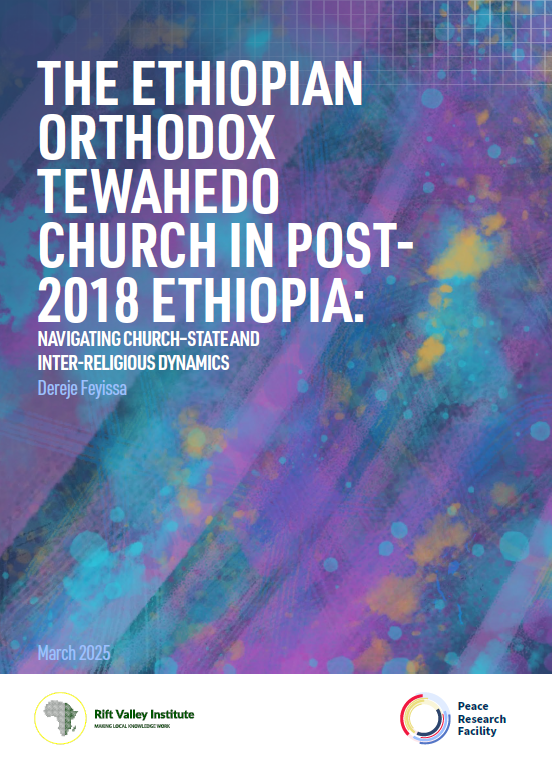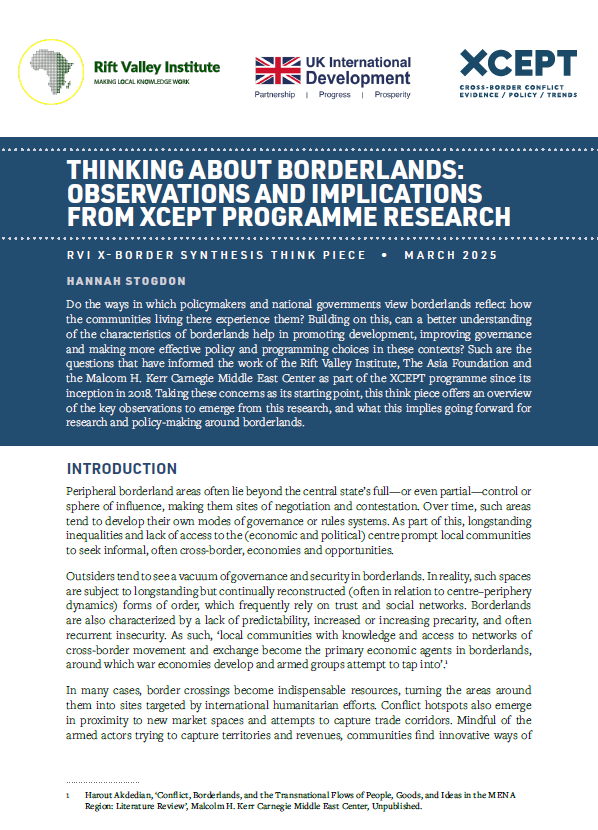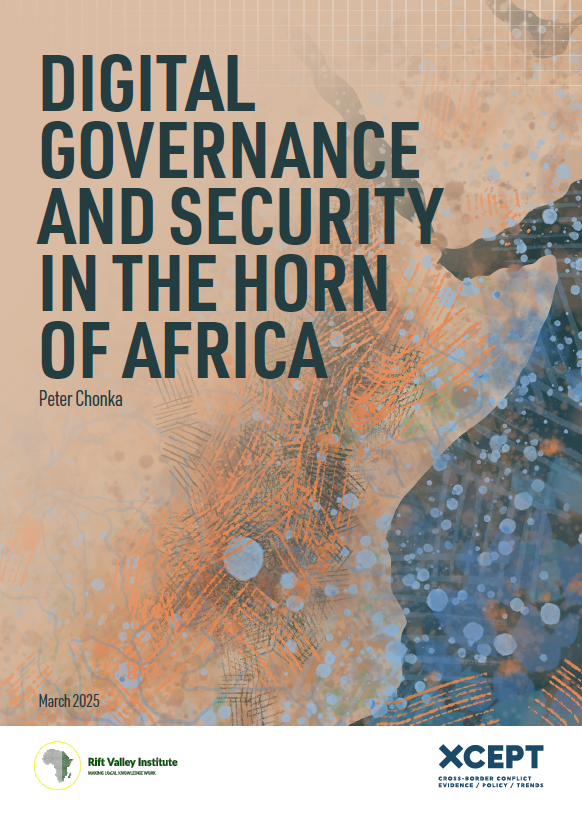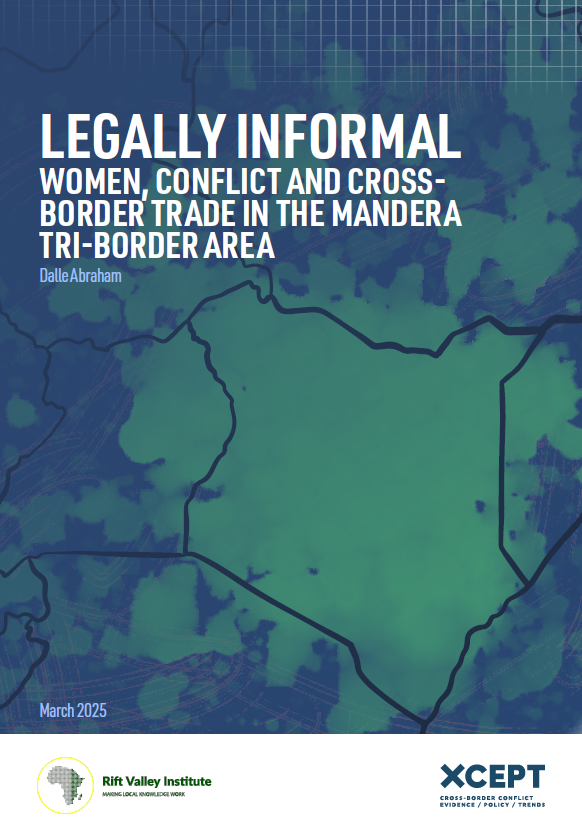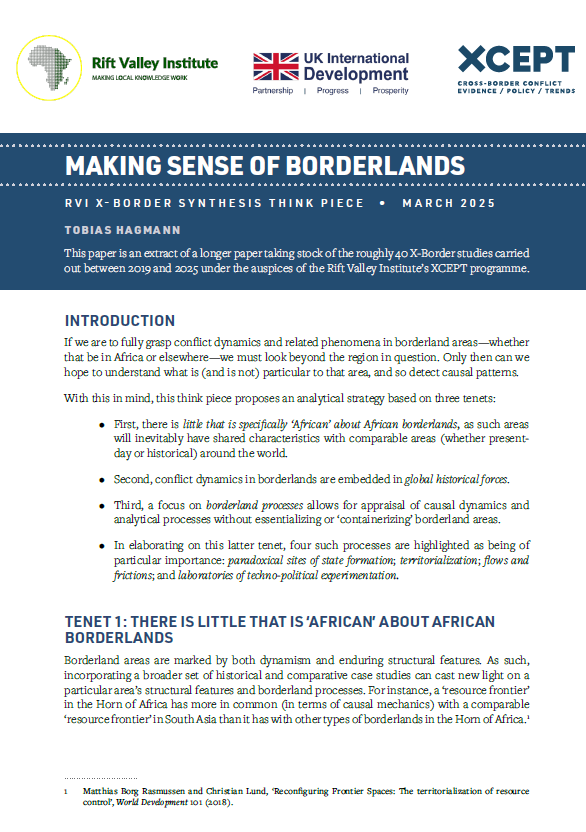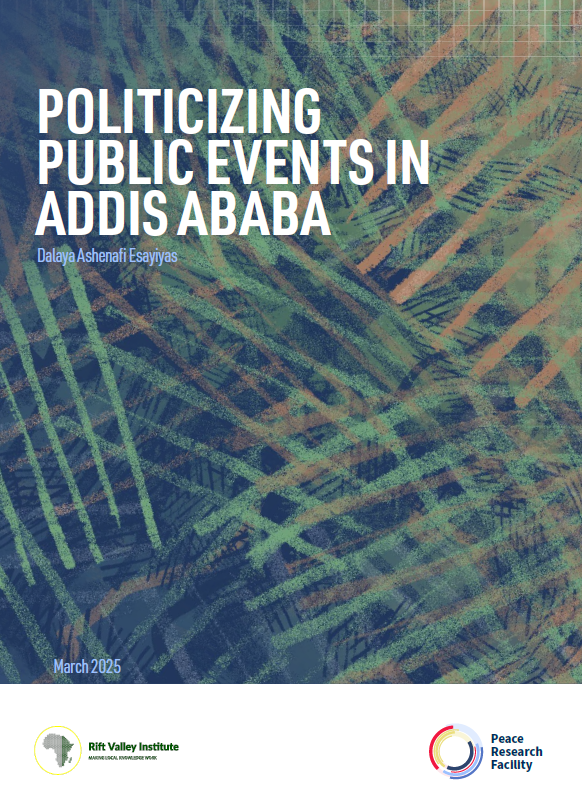በኦሮሚያ እና በሶማሊ ክልል ድንበር አካባቢ የሚገኙ አከራካሪ ቦታዎች ላይ አስተዳደራዊ ቁጥጥርን ለማጠናከር በሚደረገው ፉክክር የሚነሱ ግጭቶች የተዳፈኑ ቢመስሉም ጨርሰው አልጠፉም። ይህ በምስራቅ አፍሪካ ረጅሙ የሀገር ውስጥ የክልሎች ወሰን ሲሆን፥ አካባቢው ከ2009–2011 ግጭት እና የአገር ውስጥ መፈናቀልን ያስከተለም ነበር።…
RVI publishes books, research reports, research papers, briefings and meeting reports in a range of formats. Publications cover policy, research, arts, culture and local knowledge in the countries of eastern and central Africa. Research publications—books, reports and papers—are peer-reviewed. Some RVI publications are also available in French and/or Arabic.
The RVI is a signatory of the Budapest Open Access Initiative (2001); all publications are free for download in PDF format under Creative Commons licences. The views expressed in books and reports published by the RVI are those of the authors, not the Institute.
SEARCH
PUBLICATION TYPE
LANGUAGE
REGION
COUNTRY
በኢትዮጵያ ከአዲስ አበባ ያሉ ከተሞች ውስጥ የሚታዩ ውዝግቦችን ማጥናት ከመዲናይቱ በመቀጠል ያሉ ከተሞች ጉልህ በሆኑ የማኅበረ-ኢኮኖሚያዊና ፖለቲካዊ ለውጦች መሐል እንዴት እየተለዋወጡ እንደመጡ ለመረዳት ያግዛል። የኢትዮጵያ የከተማ ማዕከሎች የአገሪቱ የፖለቲካ ግጭቶች፥ የኢኮኖሚ ምስቅልቅሎችና ማኅበረ-ባህላዊ ስብራቶች የሚገኙባቸው ስፍራዎች ናቸው። ይህ ጭምቅ…
ከ2010 ወዲህ ያለው የኢትዮጵያ የፖለቲካ ምህዳር በጋራ ትውስታዎች የተሰናሰሉ የታሪክ አተረጓጎሞች የፖለቲካ ወገንተንነትን እንደሚቀርፁ የሚያሳይ ነው። ጠቅላይ ሚኒስትር ዐቢይ አህመድ ወደ ሥልጣን እንደመጡ የታላቁ ትውፊት ትርክቶችን (great tradition narratives) ማቀንቀናቸው የርሳቸው ድጋፍ ማዕከል ከሆነውና ይህንን ትርክት ከሚገዳደረው የኦሮሞ ማኅበረሰብ…
The report highlights the overlapping claims to and distributive struggles over territory and resources in the Oromia-Somali borderlands which animated inter-regional competition between the Oromia Regional State (ORS) and Somali Regional State (SRS), resulted in the brief 2023 uptick…
This report examines the complex and shifting situation of the Ethiopian Orthodox Tewahedo Church (EOTC) in post-2018 Ethiopia, highlighting its struggle to maintain influence amid political, social and religious changes. In addition to examining both the current EOTC relationship…
Do the ways in which policymakers and national governments view borderlands reflect how the communities living there experience them? Building on this, can a better understanding of the characteristics of borderlands help in promoting development, improving governance and making…
While digital finance—including mobile money—has developed unevenly across Somalia, Ethiopia and Kenya, such technologies are nevertheless transforming everyday economic activities. In some cases, borderlands and cross-border financial flows are central to these digital developments and are driving further innovation….
In the Mandera triangle—a pastoralist region encompassing the point at which the borders of Kenya, Ethiopia and Somalia meet—the reality of local and cross-border trade often diverges widely from official state policies of control. This disjunction has created a…
This think piece is an extract of a longer paper taking stock of the roughly 40 X-Border studies carried out between 2019 and 2025 under the auspices of the Rift Valley Institute’s XCEPT programme. If we are to fully…
The political landscape in Ethiopia since 2018 exemplifies how historical interpretations rooted in collective memory can shape political alignments. Prime Minister Abiy Ahmed Ali’s initial embrace of great tradition narratives clashed with the historical perspectives of his core constituency,…
Recent Publications

Political Economy of Cash and Markets in Sudan
February 27, 2026
The research provides a snapshot of the war in Sudan in the period from February to April 2025. However, the war is dynamic, with political alliances and territorial control changing. The April 2023 conflict between the Sudan Armed Forces (SAF)

Rethinking Ethiopia II: Youth and politics
February 26, 2026
Seminar report Rethinking Ethiopia, a collaborative essay competition initiative between Addis Ababa University’s Institute for Peace and Security Studies (IPSS) and the Rift Valley Institute’s (RVI) Peace Research Facility (PRF), offers a platform for Ethiopian youth to express their ideas

2025 Year in Review
February 16, 2026
The 2025 Year in Review provides an overview of the Rift Valley Institute’s work over the past year across eastern and central Africa. The report highlights RVI’s research and publication outputs, education and training activities, and public forums and convenings,

